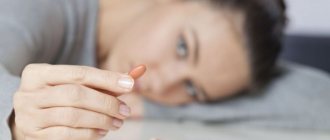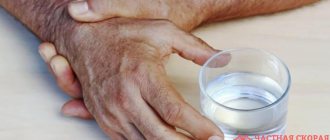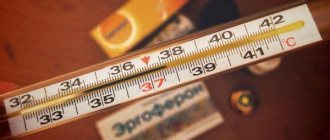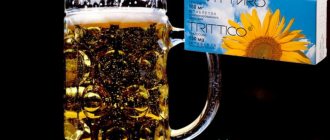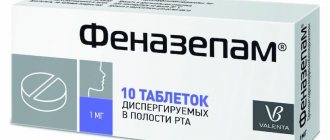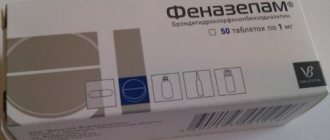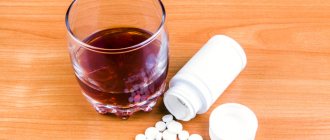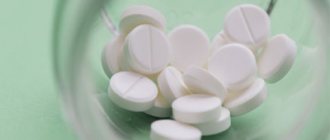Domestic tranquilizer. One of the most powerful tranquilizers. Combines sedative, hypnotic and anti-anxiety properties. It is widely used to treat mental disorders, alcohol and drug addiction, seizures and other neurological diseases.
The active substance is bromodihydrochlorophenylbenzodiazepine. Available in the form of tablets of 0.5; 1 and 2.5 milligrams and in the form of a 0.1% solution for intramuscular and intravenous administration in 1 milliliter ampoules.
The effect of the drug is achieved by enhancing the inhibitory effect of gamma-aminobutyric acid on the subcortical structures of the brain. It affects benzodiazepine receptors of neurons, triggering inhibition processes.
Indications and contraindications for treatment with Phenazepam
Instructions for use indicate various pathological conditions for which the drug is effective:
- for neuroses, psychopathy, accompanied by sudden changes in mood, anxiety, irritation, fear, tension;
- reactive psychoses, sleep disorders;
- hypochondria, autonomic dysfunction syndrome;
- epilepsy, panic attacks, dyskinesias, nervous tics;
- to prevent phobias and similar conditions;
- with increased muscle tone and rigidity;
- lability of the autonomic nervous system;
- alcohol withdrawal.
The drug is used in preliminary preparation before surgery and general anesthesia.
Phenazepam is included in the list of potent medications, has many contraindications for use and is changed for certain categories of patients. The drug is not prescribed to patients:
- in coma or shock;
- with myasthenia gravis, angle-closure glaucoma - in case of an acute attack or hereditary predisposition;
- with COPD, acute respiratory failure;
- minors, pregnant and lactating women;
- with individual intolerance to the component composition.
Supervision by a specialist during therapy is necessary for patients with renal or hepatic dysfunction. Increased caution is required when treating people with drug addiction syndrome, psychological dependence on medications, and in old age.
What is Phenazepam
It is a tranquilizer with a muscle relaxant effect. It has a serious effect on the psyche, so it is sold only with a doctor's prescription. Taken in the form of tablets or white suspension.
Phenazepam helps to relax, reduce feelings of fear, and eliminate irritability. In narcology, it is used to relieve alcohol withdrawal as a multi-day therapy, but it is absolutely not suitable for treating a regular hangover. This remedy is one of the most widely known in Russia.
Adverse reactions during therapy with Phenazepam
Non-standard reactions of the body arise against the background of the above contraindications or as an individual reaction of the body. The problem is related to the influence of the components on the functionality of the nervous system.
The majority of those undergoing the procedure experience increased drowsiness, chronic fatigue, lethargy, and attacks of dizziness. Patients complain of impaired concentration, problems with orientation in space, symptoms of ataxia, confusion, and slow psychomotor reactions.
A list of rarer side effects from Phenazepam is presented:
- cephalgia, euphoria;
- depression, tremor;
- problems with memory, coordination of movements;
- asthenia, myasthenia, dysarthria.
Occasionally, therapeutic manipulations provoke attacks of aggression, phobias, and hallucinations. Patients develop suicidal tendencies, insomnia, and muscle spasticity.
When the digestive tract is damaged, the following occurs:
- dryness of the oral mucosa;
- involuntary secretion of saliva;
- refusal to eat, constipation with diarrhea;
- heartburn, nausea, yellowing of the skin;
- increased activity of liver enzymes.
Therapy with Phenazepam can cause increased or decreased sexual desire and symptoms of dysmenorrhea. Some patients experience allergies with skin rashes and obsessive itching. A list of other adverse reactions is presented:
- addiction and development of drug dependence;
- drop in blood pressure level;
- impaired vision clarity with doubling of objects;
- weight loss, heart rhythm disturbances.
With a sharp reduction in dosage or stopping treatment, withdrawal syndrome occurs. Clinical signs of the pathology resemble the symptoms that led to the need for Phenazepam procedures.
Can phenazepam be taken with alcohol?
The instructions for the drug state that it is contraindicated to use it with alcohol. If you ignore this fact and ignore the warnings of doctors, then here are the consequences that await a person:
1.Poisoning
When alcohol and Phenazepam mix in the blood, dizziness, nausea, headache and fog occur. In some cases, hallucinations occur.
2.Addiction
Taking a drug to enhance the effects of alcohol and accelerate the onset of euphoria, a person can no longer control how much he drank. This leads to addiction to both alcohol and medications.
3.Allergies
It is impossible to guess how the addict’s body will react to such a “cocktail”; everyone’s reactions are individual. There have been cases of sudden jumps in blood pressure, difficulty breathing, and high body temperature.
4.Loss of consciousness
This symptom is characteristic of an overdose of phenazepam mixed with alcohol. If the dose was too large, then the person may fall into a coma and then the chances that he will recover tend to zero.
5.Overdose
If taking a large dose of the drug does not cause loss of consciousness, then negative consequences for the psyche and health develop. For example, a person ceases to control himself and becomes fearless, which threatens him with rash and dangerous actions. The appearance of delusional ideas and loss of contact with reality is possible.
6.Lethal dose
It is impossible to predict how the human body will react in each case, and therefore it is difficult to establish which combination and in what proportions will be fatal. It depends on the state of health and immune system, the presence of diseases of internal organs.
Dosages and methods of taking the drug from the instructions
The daily dosage of the drug is 1.5-5 mg. It is divided into 2-3 doses. In the morning, 0.5-1 mg of Phenazepam is used, in the evening the dose is increased to 2.5 mg. The daily volume should not exceed 10 mg.
The course of therapy depends on the current pathological process:
- sleep disorders - 0.25-0.5 mg half an hour before night rest;
- neuroses, psychopathy - procedures begin with 1.5-3 mg (divided into three doses), after 2-4 days - 4-6 mg;
- motor restlessness, fear, anxiety – 3 mg each, the volume is increased depending on the tolerability of the medication and to achieve the expected clinical effect;
- epileptic seizures – 2-10 mg;
- alcohol withdrawal – 2.5-5 mg;
- increased muscle tone – 2-6 mg.
To prevent addiction and the development of dependence on the drug, Phenazepam is prescribed in two-week courses. In difficult cases, therapy is extended to 2 months; discontinuation of the drug requires a gradual reduction in the initial dosage.
Time of action and elimination
When taken orally, the active substance is quickly absorbed from the digestive tract. The effect of Phenazepam can be noticed within 1-2 hours after use. During this period of time, the maximum concentration of bromodihydrochlorophenylbenzodiazepine in the blood plasma is reached. Metabolism occurs in the liver. The medication is excreted in the form of metabolites through the kidneys and urine.
The duration of action of Phenazepam is from 12 to 36 hours. This indicator is associated with the half-life of the active substance from the body, which varies from 6 to 18 hours. However, 12-18 hours after administration, the medication does not have a depressing effect on the nervous system. Therefore, to maintain an equilibrium concentration of the drug, it is recommended to take Phenazepam 2-3 times a day.
The rate of evacuation of bromodihydrochlorophenylbenzodiazepine depends on the functioning of the digestive tract, kidneys, liver and other individual characteristics of the patient.
Why alcoholism needs to be treated in a clinic
Alcohol addiction is one of the most common drug addiction diseases. You can call it a mass disaster, because this disease has entered almost every family in Russia. Alcoholism is a disease that is expressed in excessive and uncontrolled craving for alcohol. An alcoholic drinks doses of alcohol that a healthy person would never dream of, although this only happens for the time being.
Alcoholism is a real drug addiction and has all its signs. It completely subjugates the life of an addicted person, destroying all its spheres: social, physical, emotional and spiritual. Drug addiction, if it appears and is not treated, never stands still and progresses. With each intake, the patient consumes more and more alcohol, the body’s tolerance to it increases, up to the third and final stage of addiction.
Alcohol addiction, like any drug addiction, does not affect just one organ in the human body, but causes irreparable harm to the entire body. Constant severe intoxication leads to the fact that toxins clog the body and are not removed from it immediately, because the liver and kidneys cannot cope with such a volume of poisons.
It is the constant intake of alcohol in the body that leads to such a phenomenon characteristic of this disease as alcohol withdrawal syndrome.
Physical craving for alcohol
With constant use, ethyl alcohol has an active effect on the body and is included in its subtle biochemical processes. It replaces natural compounds that are normally produced by the body. Now they enter him effortlessly and in large doses. Naturally, natural compounds stop being produced because there is no need for it.
This is how a person acquires a physical craving for alcohol. When the patient’s body does not receive the next dose, it turns out that the body is left without the biochemical elements necessary to ensure life. At this moment, a person feels pain, functional physiological disorders, psychological discomfort, that is, he begins to experience alcohol withdrawal syndrome, also known as alcohol withdrawal syndrome, which requires treatment.
“Help” - comprehensive treatment of alcoholism
You can contact a drug treatment center in case of acute situations that are not uncommon in alcohol addiction: binge drinking, withdrawal syndrome, acute alcohol poisoning. You can call a narcologist at your home by calling our 24-hour hotline. The doctor arrives on call within an hour.
You can also contact our specialists if you experience withdrawal symptoms after a course of treatment with phenazepam. As we noted above, this drug can also cause addiction.
You can undergo a full course of treatment for alcoholism, which includes detoxification, rehabilitation and resocialization. Very often, before starting treatment, the patient’s motivation is required, because alcohol addicts rarely want to be treated. This entire range of services is offered in ours.
I don’t want to scare you, but every day, until alcoholism is treated, the disease harms a person’s health. Daily intoxication is dangerous in itself, and also leads to chronic diseases of internal organs. Therefore, every day that you do nothing, the cost of treatment increases. And on temporary measures, such as withdrawal from binge drinking, treatment of withdrawal syndrome, you end up spending the same amount as you would spend on a complete cure.
That is why we recommend that you seek help today, thus preserving the health of your relative and saving on less expensive treatment. At any time, you can call our call center, its number is listed on the website page, or fill out the feedback form, and we will call you back. Start your journey to a life free from alcohol addiction now.
Treatment of withdrawal symptoms
Treatment of withdrawal syndrome in alcoholism can be carried out in a specialized clinic and at home. Limitations on the provision of care at home include a complicated medical history and the critical condition of the patient. Otherwise, everyone decides for themselves what is more convenient and profitable for them; any option has its advantages:
- A familiar home environment is more psychologically comfortable for the patient.
- Relatives are able to carefully take care of the needs of the alcoholic.
- When treated at home, you save on hospital stays.
- Treatment and diagnostic hardware is available at the clinic.
- Constant medical supervision makes it possible to urgently provide the necessary assistance.
- There is no access to alcohol in the clinic
Psychological craving for alcohol
The human psyche is always looking for the missing link that will help it experience the greatest thrill from life. In the case of alcohol addiction, this high is chemical. A person prone to alcoholism experiences more pain than joy from contact with reality.
Some experts believe that the issue is a congenital defect in the biochemical processes of the body of the future drug addict. Such a person is already born with disturbances in the production of a certain type of natural neurostimulants. Therefore, he experiences less joy, satisfaction, and desire to act actively than people whose production of these compounds is normal.
In addition, there are various complexes, fears, attitudes that prevent a person from building normal productive and happy relationships with the world, with people. Some of them are related to character traits, others to upbringing. Many of our parents’ attitudes are harmful and limiting beliefs, because our parents and grandparents had a hard time. And now their experience becomes a heavy burden for us, which prevents us from developing in new conditions.
Result: failures, loneliness, lack of joy in life. In fact, such a person lacks the same natural stimulants: adrenaline, endorphins, serotonin, as the first type of people, whose biochemistry is disturbed from birth. The result is a stable psychological attraction to alcohol.
How does binge drinking occur?
Binge drinking is a long-term, constant, uncontrolled consumption of alcohol. An alcoholic is unable to stop the binge on his own, so in this situation he needs the help of loved ones and calling a narcologist.
An alcoholic cannot stop drinking on his own
By taking another dose of alcohol, the alcoholic tries to get rid of withdrawal symptoms. Each time use is stopped, withdrawal symptoms begin to appear within 5-6 hours. And here there are two options: endure the painful manifestations or seek treatment from a narcologist. Since the patient has a hard time: he has a headache, his blood pressure fluctuates, tachycardia and shortness of breath, depression appear, he is rarely able to endure all this.
Keep in mind that unlike a hangover, alcohol withdrawal symptoms worsen over several days and can even last several weeks in total. But once upon a time, alcohol brought positive experiences to the alcoholic, which allowed him to become hooked on addiction.
Effective treatment for alcoholism
Treatment of alcoholism in the full sense of the word is the achievement of freedom from addiction, long-term remission. Such treatment involves drug detoxification of the body, rehabilitation and adaptation to ordinary life - socialization.
Most alcohol addicts do not immediately seek such treatment; in fairness, it is worth saying that their relatives usually call a narcologist when their drinking bouts begin. Therefore, in addition to the full course of treatment, there are also a lot of procedures that help a person with addiction stay afloat: treatment of withdrawal symptoms, withdrawal from binge drinking, coding. These services in narcology are in widespread demand today.
